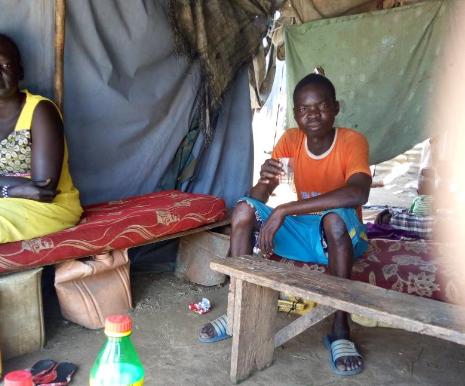You are here: Home | Breaking News | Featured | Interviews | Medical practitioner urges gov’t to regulate “siko”

A young man taking local brewery in Juba | photo | Eluzai Billy
A medical practitioner from Upper Nile State, Dr Ayik Kuir, has urged the government to regulate the local alcoholic brew, “siko”.
Kuir who works at the Friendship Hospital in Paloch said the brew has sever long and short term effects on the body.
“With siko there are no measure(ments) that determine the value of how much a person is drinking. It cannot be compared to those of whiskey, wine, white special and etc,” he said in an interview with Eye Radio.
The local brew is popular with young people in the country who often can’t afford to buy commercial brands of alcohol available on the market.
Dr Kuir said since no one knows how much alcohol is in it, it can have disastrous effects on the central nervous system and reproductive organs.
“When a young girl is pregnant sometimes she can experience miscarriage during child-birth and the boys will fail to produce sperm sometimes and they can experience other infectious diseases like liver failure,” he stressed.
Recently, three young men between the ages of 15 and 20 were arrested in Juba, after raping and mutilating two women near a local siko brewery.
Police said the three were drunk on siko, when they committed the crimes.
Dr Kuir advised young people to take small quantities of siko, as it’s more dangerous than other brands. There have been claims that Siko is contains 100% alcohol and when taken daily it can destroy a person’s liver within 6 months.
However, no studies have been done to test the alcohol content in the siko consumed by locals.
Dr Kuir urged the South Sudan Bureau of Standards and the health department to regulate its production.
“There are no rules, up to now, that regulate the manufacturing of local alcohol in the country,” he said.
However, regulating the production of siko will rob many who depend on it to make an income.
Local brewers of the spirit are already complaining of low sales.
“Business these days is not like those days because of the economic crises in the country. The prices of goods are very high in the market,” said Juan, who sells Siko in the Jebel residential area.
“Before I was able to sell 20 litres of (siko) in a day but now I only sell 8 litres, where it will cost me around 1,500 SSP to make the alcohol. I will get 2,000 SSP out of it, where the net profits is 500 SSP only, how am going to feed my family with it.”
Juan admitted facing problems which come with the trade of alcohol, but her only concern is money.
“There are some bad consumers who will come to drink and will say that I will bring me the money tomorrow but he/she will go forever and this is going to make me to get loss in my business,” she said.
It is not only the economic crisis which is fueling trade in alcohol. Psycho-social trauma following years of war has forced many especially the young to seek comfort in alcohol.
One graduate who spoke to Eye Radio on condition of anonymity said he drinks because he has nothing better to do.
“I am a graduate from university, but there is no work that I can do, that’s why I resort to drink to remove the stress of a jobless life,” he said.
Another man named Sebit said he takes one bottle of siko a day to help him sleep after a long day at work.
“I am working a heavy work of water distribution, that’s why I drink to relieve my body of the pain.”
He said after pushing large jerry cans of water in a wheelbarrow, all he looks forward to is resting well at night.
A 2017 study by the World Health Organization found that South Sudanese consumed more alcohol per ca-pita than the rest of the African continent, a fact which could make the regulation of home brew spirits like “siko” difficult.
Support Eye Radio, the first independent radio broadcaster of news, information & entertainment in South Sudan.
Make a monthly or a one off contribution.
Copyright 2024. All rights reserved. Eye Radio is a product of Eye Media Limited.